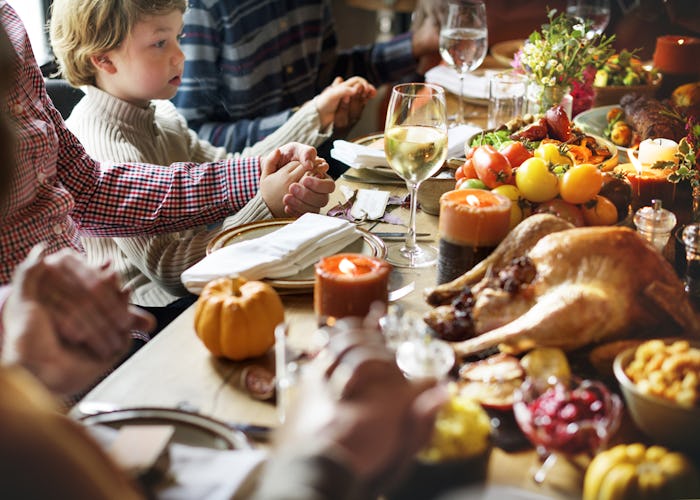Life
Yes, You Need To Talk To Your Kids About Toxic Relatives During The Holidays
Coming to the conclusion that someone you love is an inherently toxic person is a painful journey. Eventually, lots of people decide to limit their exposure to parents, siblings or other family members because they're just too much to handle emotionally — but find themselves making exceptions during the holidays, when everyone is expected to put their bad feelings aside in the spirit of goodwill. So how do you explain toxic relatives to kids who want to know why their uncle is being mean to Grandma when everyone's trying to enjoy the turkey or why someone they love isn't sitting across from them at the Thanksgiving table?
Try as you might to shield your kid from the unpleasantness of family conflict, children are generally a lot better than adults give them credit for at sniffing out tension. From addiction to personality disorders to just plain disagreeableness, most families deal with some kind of dysfunction, and kids deserve an age-appropriate explanation for the behavior they might witness.
Unfortunately, the risks for mismanaging your child's interaction with these loved ones are real. In fact, there's a whole host of potential undesirable outcomes when a kid's perception of the family situation is different from what he's told, as Brown University's Counseling & Psychological Services blog explains. Children might be forced to take sides between parents or relatives. They might experience "reality shifting" when what is said is different than what is done, as well as rejection or preferential treatment within the family. Without being addressed, interactions with toxic relatives can undermine a child's trust in their own foundational relationships and their sense of self-worth. Fortunately, these results can be easily avoided with an uncomfortable and appropriately honest conversation with your kids.
In an interview with Romper, psychotherapist Dr. Kathryn Smerling says children have their own roles in the family, and while you may find a particular character difficult or offensive, they might have a good relationship with your child.
"That puts conflict into the child very unintentionally," she says. "I think that parents give off very subliminal messages about whether they like or don’t like someone through body language and children think they aren't doing an OK thing for their parents if they don't like someone."
But once a child notices that a grandparent or aunt brings a poisonous element to family gatherings, it's important to remember that kids look to their parents for confirmation and validation. If they start asking inconvenient questions, it means they've picked up on a particular family dynamic or a relative's strange way of interacting, so don't deny what the child's own eyes and ears are telling them. Just be careful not to mix in your own opinions and experiences to draw the child into the family drama.
"If a child brings up to you that uncle Arthur's acting funny you can say 'yes, sometimes he drinks too much and that’s what happens,'" she says. "You can validate the reality, but you don’t have to embellish it with how hard you’ve had it over the last 25 years dealing with him."
But a neutral approach is not going to cut it if the offender starts directing their toxic behavior at your child. The trick is to address it without escalating the situation, she says.
"You have to protect your child at all costs and bring it to the attention of the person," she says. "You can say, 'I’m not sure your aware that you’re criticizing Adam every time he does something and I would appreciate it if you didn’t do that.'"
Doling out age-appropriate, honest information is key to establishing a sense of validation in kids when toxic relatives are afoot. After all, it's the holidays and the kids just want to enjoy the company of their loved ones and the festivities. There are plenty of years ahead of them to become mired in their own dramas, so it's best to acknowledge the facts and let them eat their pie.
